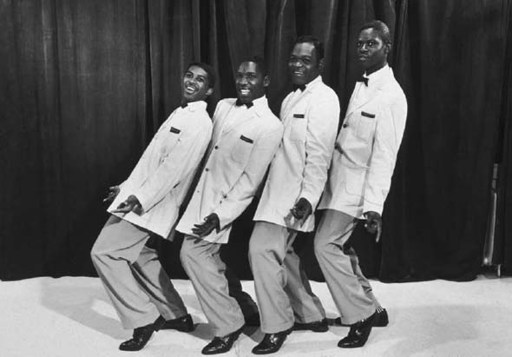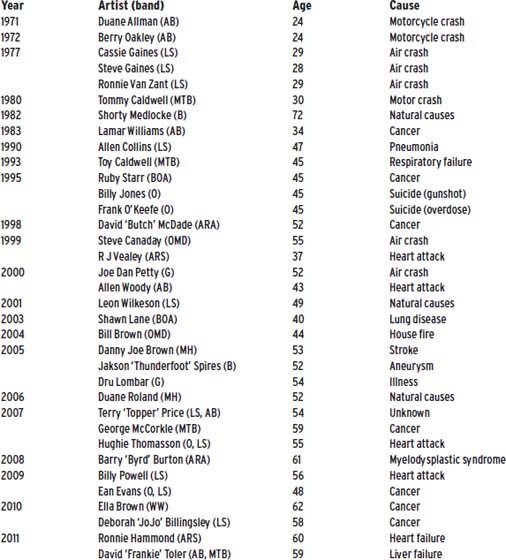The Encyclopedia of Dead Rock Stars (315 page)
Read The Encyclopedia of Dead Rock Stars Online
Authors: Jeremy Simmonds

Golden Oldies #50
Hank Medress
(Brooklyn, New York, 19 November 1938)
The Tokens

Partially responsible for one of the classic vocal hits of all time, Hank Medress began his journey to pop immortality with The Linc-Tones, a quintet that formed at Brooklyn’s Abraham Lincoln High School in 1955. The original star of this troupe was Neil Sedaka, who left to begin his own remarkable solo career in 1957. The remaining singers - Medress and Jay Siegel, plus brothers Phil and thirteen-year-old Mitch Margo - resurfaced in 1960 as The Tokens, and signed with Warwick and then RCA Victor.
Though their success was to be fleeting, the following year was to be a good one for Medress and his cohorts. The Tokens’ first hit, ‘Tonight I Fell In Love’ (1961), made the Top Twenty and shifted half a million copies, putting the group on
American Bandstand.
The next release, however, had the kids singing. ‘The Lion Sleeps Tonight’, a rewrite of a twenties tune called ‘Mbube’ (a chant for some reason misheard thereafter as ‘wimoweh’), topped the US charts for three weeks in early 1962, an enormous international hit and a perennial evergreen, covered by many.
While The Tokens failed to repeat the trick, they were given production credits on a number of other records (including several hits by The Chiffons and The Happenings), which stood Medress in good stead for his later career. The singer left The Tokens to co-produce with Dave Appell throughout the seventies and eighties, the pair working on many of Tony Orlando & Dawn’s hits, including the global number one ‘Tie a Yellow Ribbon’ (1973). They also worked with Melissa Manchester, Dan Hill, Frankie Valli and Rick Springfield. Hank Medress later became a major executive at EMI Music Publishing Canada and a partner in R & B label Bottom Line Records.
The former Token died from lung cancer at his Manhattan home on 18 June 2007. He was survived by four children.
Friday 29
George McCorkle
(Spartanburg, South Carolina, 11 October 1947)
The Marshall Tucker Band
(Various acts)

Guitarist George McCorkle was a founding member of Southern rock legends The Marshall Tucker Band, his guitar style strongly influenced by the blues musicians to whom he’d listened as a boy.
McCorkle couldn’t escape the draft, in the mid-to-late sixties serving with the US Navy in Italy – which only made him the hungrier to pursue a career in music on his return home. With childhood pal Toy Caldwell – an ex-marine who was also quite tasty on the guitar – McCorkle formed Toy Factory, splitting his time between this and another project, Pax Parachute. It was clear, though, that the two guitarists worked well together, Caldwell and McCorkle forming The Marshall Tucker Band in 1972, adding the former’s brother Tommy on bass, Jerry Eubanks on flute and sax, drummer Paul Riddle, and keyboardist and vocalist Doug Gray. Accomplished musicians all, The Marshall Tucker Band picked up fans overnight, a major one being Southern fiddler Charlie Daniels, for whom McCorkle had penned the song ‘Fire in the Mountain’. (In the event, MTB recorded this themselves and scored a Billboard Top Forty hit in 1974.) During the seventies, the group scored seven consecutive gold or platinum albums for Capricorn.
The band endured the tragedy of Tommy Caldwell’s death
( April 1980)
April 1980)
and secured further releases with Warner Brothers, though their appeal diminished during the cooler musical climes of the 1980s. McCorkle left The Marshall Tucker band in 1984 and, having a fine grounding in country music, then moved to Nashville, working most of the time as a songwriter, his songs recorded by artists such as chart-topper Gary Allan. George McCorkle had only recently been diagnosed with cancer at the time of his death at the University Medical Center, Lebanon, Tennessee.
The Marshall Tucker Band – under Gray’s stewardship – are still a going concern, and thankfully, McCorkle had the chance to play one final guest show with them in August 2006.
See also
Toy Caldwell ( March 1993)
March 1993)
DEAD INTERESTING
FLIRTIN’ WITH DISASTER–THE TIMELINE OF SOUTHERN ROCK CASUALTIES
As a genre, Southern rock–a heady blend of rock ‘n’ roll, country and the blues–has been beset with tragedy and trauma. The table below displays just how many of Southern rock’s major players have parked the ol’ pickup at that great juke joint in the sky. (With ten deceased members–eleven, if one counts manager Dean Kilpatrick–the great Lynyrd Skynyrd can be seen to lead the pack.)
Key: AB–Allman Brothers; ARA–Amazing Rhythm Aces; ARS–Atlanta Rhythm Section; B–Blackfoot; BOA–Black Oak Arkansas; G–Grinderswitch; LS–Lynyrd Skynyrd; MH–Molly Hatchet; MTB–Marshall Tucker Band; OMD–Ozark Mountain Daredevils; O–Outlaws; WW–Wet Willie
Further details about the above artists can be found in the appropriate chapters of The
Encyclopedia of Dead Rock Stars.

The Drifters in 1959, with Bill Pinkney at second left: “Don’t lean back any further Ben, else we’ve all had it!”
JULY
Golden Oldies #51
Bill Pinkney
(Dalzell, South Carolina, 15 August 1925)
The Drifters
(Bill Pinkney’s Original Drifters)
(Various acts)

Although recognised as the last-surviving original member of The Drifters, Bill Pinkney, in truth, joined the enduring vocal group in its second line-up: the first, compiled by Clyde McPhatter early in 1953, was deemed unsuitable by manager Ahmet Ertegun.
Pinkney himself had graduated from gospel vocal act, The Jerusalem Stars. A US Army vet who had earned medals for service during World War II, Pinkney was a true presence and possessed a remarkable multi-octave range that enabled him to sing baritone, tenor and his favoured bass. McPhatter’s Drifters were completed by brothers Gerhart (second tenor) and Andrew Thrasher (baritone), Willie Ferbee (bass) and guitarist Walter Adams (who died shortly after the first recording, replaced by Jimmy Oliver). The first hit - ‘Money Honey’ - duly arrived on Atlantic Records in September, the record holding the US R & B top slot for a remarkable eleven weeks. As it was to prove for much of The Drifters’ existence, however, line-up changes were inevitable, with Pinkney - who even endured two brief spells as The Drifters’ road manager - shifting to bass. The hits continued, though, in the shape of ‘Honey Love’ (a second R & B chart-topper), ‘White Christmas’ (Pinkney sharing lead), ‘Such a Night’ (all 1954), ‘Whatcha Gonna Do?’ and another number one, ‘Adorable’ (both 1955).
